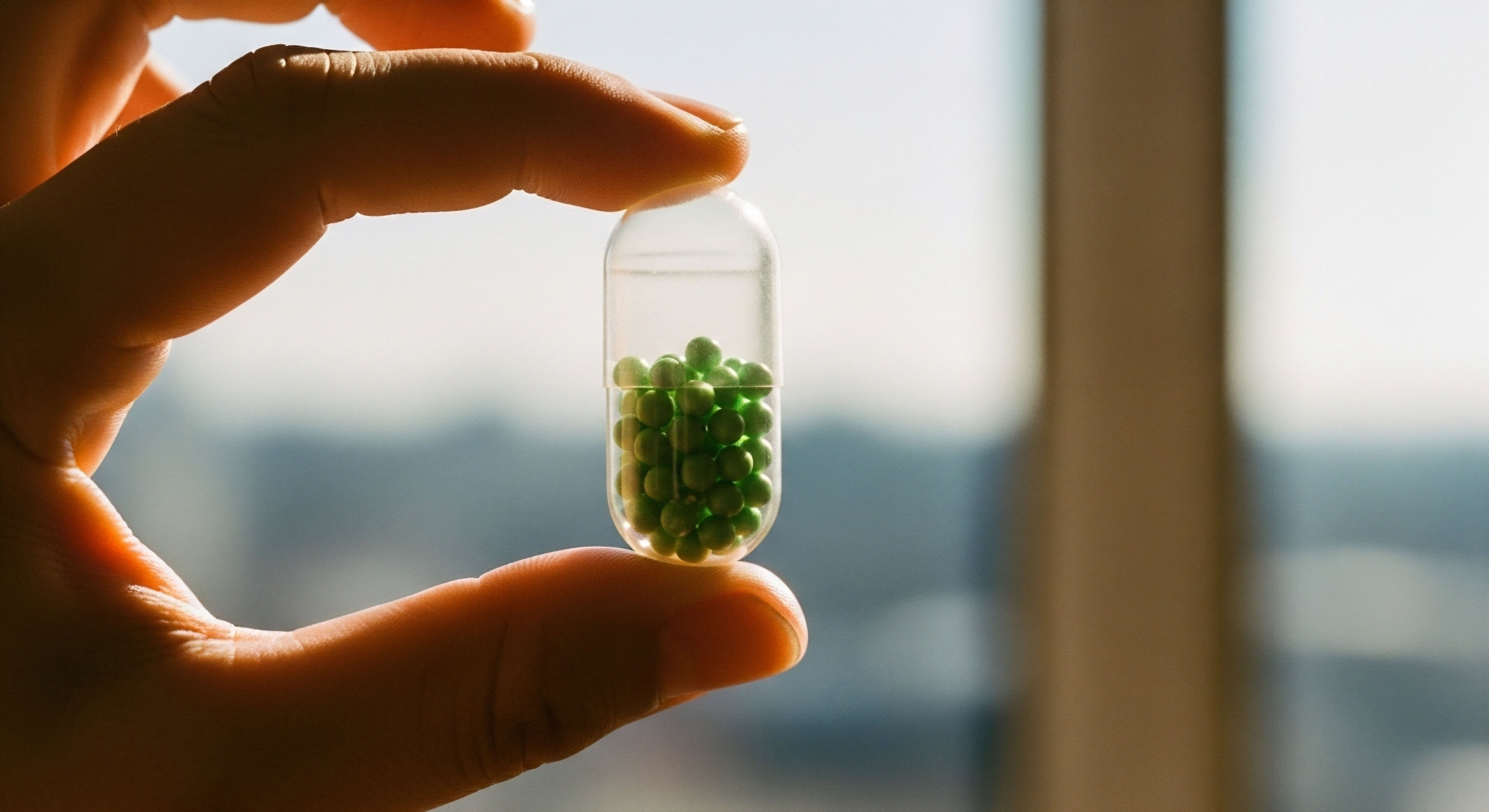

Fundamentals
Perhaps you have noticed a subtle shift in your mental landscape. A moment of hesitation when recalling a name, a slight cloudiness that settles over your thoughts, or a persistent feeling of diminished mental sharpness. These experiences are not merely isolated incidents; they are often signals from your body, indications that its intricate internal systems may be operating outside their optimal balance.
Understanding these signals marks the initial step toward reclaiming your vitality and cognitive clarity. It is a personal journey, one that begins with recognizing your own biological rhythms and how they influence your daily experience.
Within this complex biological framework, hormones serve as vital messengers, orchestrating countless bodily functions. Among these, testosterone holds a significant, often underestimated, position beyond its well-known reproductive associations. While commonly linked to male physiology, it plays a crucial role in both men and women, influencing everything from muscle mass and bone density to mood regulation and cognitive sharpness.
When levels of this essential hormone begin to wane, whether due to aging, lifestyle factors, or other influences, the repercussions can extend far beyond physical changes, reaching into the very core of your mental acuity.
The brain, a remarkably dynamic organ, relies on a precise hormonal environment to function at its peak. Testosterone contributes to this environment by interacting with specific receptors in various brain regions, including those responsible for memory, attention, and spatial awareness.
A decline in its circulating levels can therefore contribute to the cognitive shifts many individuals experience, such as reduced concentration, difficulty with recall, or a general sense of mental fatigue. Recognizing this connection is paramount; it allows us to move beyond simply accepting these changes as inevitable aspects of aging and instead consider actionable strategies.
Cognitive shifts often signal underlying biological imbalances, inviting a deeper look into hormonal influences.
Lifestyle interventions stand as a foundational element in supporting overall hormonal health, including the body’s natural production and utilization of testosterone. These interventions are not about quick fixes; they represent a consistent, deliberate recalibration of daily habits that collectively influence your endocrine system.
Simple, yet profound, adjustments to how you nourish your body, how you move, and how you manage daily pressures can significantly impact your hormonal equilibrium. This foundational support can help the body maintain its inherent capacity for balance, setting the stage for improved cognitive function and overall well-being.

What Is Testosterone’s Role in Brain Function?
Testosterone’s influence on the brain extends to various cognitive domains. It impacts the hippocampus, a brain region central to learning and memory formation. Studies indicate that adequate testosterone levels correlate with better performance in tasks requiring spatial memory and verbal recall.
This hormone also modulates neurotransmitter systems, such as dopamine, which is involved in motivation, reward, and executive functions. When testosterone levels are suboptimal, these neural pathways may not operate with the same efficiency, potentially leading to the subjective experience of mental fog or reduced drive.
The presence of testosterone receptors in widespread brain areas underscores its broad impact. These receptors are found in the cerebral cortex, hippocampus, and amygdala, regions vital for higher-order thinking, emotional regulation, and memory. The hormone can exert its effects directly, by binding to androgen receptors, or indirectly, through its conversion to other active steroids like estradiol via the enzyme aromatase. This dual mechanism highlights the complexity of its actions and the interconnectedness of the endocrine system.


Intermediate
For individuals seeking to address cognitive changes potentially linked to hormonal shifts, a deeper understanding of specific clinical protocols and lifestyle strategies becomes essential. The objective is to restore systemic balance, allowing the body’s inherent intelligence to guide its functions. This involves a thoughtful consideration of how daily habits interact with advanced therapeutic options, creating a synergistic approach to wellness.

How Do Lifestyle Interventions Support Hormonal Balance?
Lifestyle interventions serve as powerful modulators of endocrine function, directly influencing testosterone levels and, by extension, brain health. These are not merely supplementary actions; they are fundamental components of any comprehensive wellness strategy.
- Nutritional Biochemistry ∞ Dietary choices profoundly affect hormonal synthesis and metabolic pathways. A diet rich in whole, unprocessed foods, healthy fats, and adequate protein provides the necessary building blocks for hormone production. Avoiding excessive sugar and refined carbohydrates helps maintain insulin sensitivity, which is critical since insulin resistance can negatively impact testosterone levels. Specific micronutrients, such as zinc and vitamin D, are also recognized for their roles in testosterone synthesis.
- Physical Activity Protocols ∞ Regular physical activity, particularly resistance training and high-intensity interval training (HIIT), has been shown to acutely and chronically elevate testosterone levels. This type of exercise stimulates muscle growth, which is metabolically active tissue, and can improve body composition, reducing adiposity that can convert testosterone to estrogen. Consistent movement patterns also support healthy circulation, ensuring optimal delivery of hormones and nutrients to brain tissue.
- Sleep Architecture Optimization ∞ Sleep is a period of significant hormonal restoration and regulation. Chronic sleep deprivation can disrupt the delicate balance of the hypothalamic-pituitary-gonadal (HPG) axis, leading to decreased testosterone production. Aiming for 7-9 hours of quality sleep nightly supports the natural pulsatile release of hormones, including testosterone, which is often highest during the early morning hours following a night of restful sleep.
- Stress Response Modulation ∞ Chronic psychological or physiological stress elevates cortisol, a hormone that can antagonize testosterone production. Implementing stress-reducing practices, such as mindfulness, meditation, or spending time in nature, helps to lower cortisol levels, thereby creating a more favorable environment for testosterone synthesis and action.
Consistent lifestyle adjustments provide a powerful foundation for hormonal equilibrium and cognitive vitality.
These lifestyle adjustments, when implemented consistently, can significantly improve endogenous testosterone production and its bioavailability, leading to improvements in cognitive function, mood, and overall energy.

When Is Hormonal Optimization Considered?
While lifestyle interventions are foundational, there are instances where the body’s systems require additional support to recalibrate. This is where targeted hormonal optimization protocols, such as Testosterone Replacement Therapy (TRT) and Growth Hormone Peptide Therapy, become relevant. These interventions are considered when clinical symptoms align with laboratory findings of suboptimal hormone levels, and when lifestyle modifications alone have not achieved the desired physiological restoration.

Testosterone Replacement Therapy for Men
For men experiencing symptoms of low testosterone, such as persistent fatigue, reduced muscle mass, diminished libido, or cognitive dullness, TRT can be a transformative intervention. The standard protocol often involves weekly intramuscular injections of Testosterone Cypionate (200mg/ml). This exogenous testosterone helps restore circulating levels to a physiological range, alleviating symptoms.
To maintain the body’s natural testosterone production and preserve fertility, Gonadorelin (2x/week subcutaneous injections) may be co-administered. Gonadorelin stimulates the pituitary gland to release luteinizing hormone (LH) and follicle-stimulating hormone (FSH), which signal the testes to produce testosterone and sperm.
Additionally, Anastrozole (2x/week oral tablet) is often included to manage the conversion of testosterone to estrogen, preventing potential side effects associated with elevated estrogen levels, such as gynecomastia or fluid retention. Some protocols may also incorporate Enclomiphene to further support LH and FSH levels.

Testosterone Replacement Therapy for Women
Women also experience the impact of testosterone on their well-being, particularly during peri-menopause and post-menopause. Symptoms like irregular cycles, mood changes, hot flashes, and low libido can be linked to declining testosterone. Protocols for women typically involve lower doses, such as 10 ∞ 20 units (0.1 ∞ 0.2ml) of Testosterone Cypionate weekly via subcutaneous injection.
Progesterone is often prescribed concurrently, especially for women in menopausal transition, to ensure hormonal balance and protect uterine health. Another option is Pellet Therapy, which involves long-acting testosterone pellets inserted subcutaneously, providing a steady release of the hormone. Anastrozole may be used with pellet therapy when appropriate to manage estrogen levels.

Post-TRT or Fertility-Stimulating Protocol for Men
For men discontinuing TRT or actively seeking to restore fertility, a specific protocol is employed to reactivate endogenous testosterone production. This typically includes Gonadorelin, Tamoxifen, and Clomid. These agents work synergistically to stimulate the HPG axis, encouraging the testes to resume natural hormone synthesis. Anastrozole may be an optional addition to manage estrogen during this transition.

Growth Hormone Peptide Therapy
Peptide therapies represent another avenue for systemic support, particularly for active adults and athletes seeking anti-aging benefits, muscle gain, fat loss, and sleep improvement. These small chains of amino acids act as signaling molecules, influencing various physiological processes.
Commonly utilized peptides include:
- Sermorelin ∞ A growth hormone-releasing hormone (GHRH) analog that stimulates the pituitary to produce more growth hormone.
- Ipamorelin / CJC-1295 ∞ Both are growth hormone secretagogues, working to increase the pulsatile release of growth hormone.
- Tesamorelin ∞ A GHRH analog specifically approved for reducing abdominal fat in certain conditions.
- Hexarelin ∞ Another growth hormone secretagogue with potential benefits for cardiac function.
- MK-677 ∞ An oral growth hormone secretagogue that increases growth hormone and IGF-1 levels.
These peptides can indirectly support brain health by improving sleep quality, reducing inflammation, and enhancing cellular repair mechanisms, all of which contribute to a more optimal environment for cognitive function.

Other Targeted Peptides
Beyond growth hormone-related peptides, others address specific physiological needs:
- PT-141 ∞ Used for sexual health, specifically to address libido concerns by acting on melanocortin receptors in the brain.
- Pentadeca Arginate (PDA) ∞ Utilized for tissue repair, healing processes, and modulating inflammatory responses.
The careful application of these protocols, always under clinical guidance, aims to restore a biochemical balance that supports not only physical well-being but also the intricate functions of the brain.
| Protocol/Agent | Primary Action | Targeted Benefit |
|---|---|---|
| Testosterone Cypionate (Men) | Exogenous testosterone replacement | Restores circulating testosterone levels, alleviates symptoms of low T |
| Gonadorelin | Stimulates pituitary LH/FSH release | Maintains natural testosterone production, preserves fertility |
| Anastrozole | Aromatase inhibition | Reduces estrogen conversion, mitigates estrogen-related side effects |
| Testosterone Cypionate (Women) | Low-dose exogenous testosterone | Addresses symptoms of low T in women, supports libido and mood |
| Progesterone (Women) | Hormone balance, uterine protection | Supports menstrual regularity, reduces menopausal symptoms |
| Sermorelin / Ipamorelin | Growth hormone secretagogues | Increases growth hormone release, supports cellular repair, sleep |


Academic
The relationship between testosterone and brain health extends beyond simple correlation, delving into complex molecular and cellular mechanisms. A comprehensive understanding requires examining the interplay of the endocrine system with neurobiology, considering how hormonal fluctuations impact neural architecture, neurotransmission, and overall cognitive resilience. This exploration moves beyond surface-level observations to address the intricate biological axes and metabolic pathways that underpin brain function.

Testosterone’s Neurobiological Influence
Testosterone, a steroid hormone, exerts its effects on the brain through multiple pathways. Its lipophilic nature allows it to readily cross the blood-brain barrier, where it can act directly on androgen receptors (ARs) expressed in various neuronal populations.
These ARs are particularly abundant in regions such as the hippocampus, prefrontal cortex, and amygdala, which are critical for memory consolidation, executive functions, and emotional processing, respectively. Activation of these receptors can modulate gene expression, influencing neuronal survival, dendritic arborization, and synaptic plasticity ∞ the ability of synapses to strengthen or weaken over time, a fundamental process for learning and memory.
Beyond direct AR activation, testosterone also functions as a neurosteroid precursor. Within the brain, it can be enzymatically converted into other active steroids. The enzyme 5-alpha reductase converts testosterone to dihydrotestosterone (DHT), a more potent androgen, which also binds to ARs. Conversely, the enzyme aromatase converts testosterone into estradiol, a primary estrogen.
Estradiol then acts on estrogen receptors (ERα and ERβ) within the brain, which are also widely distributed and play significant roles in neuroprotection, synaptic function, and cognitive processes. This conversion highlights a critical aspect of testosterone’s neurobiological action ∞ its effects are often mediated, in part, by its estrogenic metabolites. The balance between androgenic and estrogenic signaling within specific brain regions is a determinant of cognitive outcomes.
Testosterone’s brain effects involve direct receptor binding and conversion to other neuroactive steroids.
Testosterone also influences neurotransmitter systems. It can modulate the synthesis, release, and reuptake of key neurotransmitters such as dopamine, serotonin, and acetylcholine. For instance, testosterone has been shown to upregulate dopamine receptor density and dopamine turnover in certain brain areas, contributing to its role in motivation, reward-seeking behaviors, and executive control. Dysregulation of these neurotransmitter systems is implicated in various cognitive and mood disorders, suggesting a mechanistic link between hormonal balance and mental well-being.

Interplay with Metabolic Pathways and Neuroinflammation
The endocrine system does not operate in isolation; its functions are deeply intertwined with metabolic health and inflammatory processes, both of which profoundly impact brain function. Low testosterone is frequently observed in individuals with metabolic dysregulation, including obesity and type 2 diabetes.
Adipose tissue, particularly visceral fat, is a significant source of aromatase, leading to increased conversion of testosterone to estradiol and a subsequent reduction in circulating testosterone. This creates a feedback loop where obesity contributes to lower testosterone, and lower testosterone can exacerbate metabolic dysfunction.
Insulin resistance, a hallmark of metabolic syndrome, can directly impair brain glucose metabolism and neuronal function. Testosterone has been shown to improve insulin sensitivity, suggesting a pathway through which it can indirectly support cognitive health by optimizing metabolic processes within the brain. Furthermore, chronic low-grade inflammation, often associated with metabolic dysfunction, can contribute to neuroinflammation, a process implicated in neurodegenerative conditions and cognitive decline. Testosterone possesses anti-inflammatory properties, potentially mitigating neuroinflammatory responses and preserving neuronal integrity.
The concept of the Hypothalamic-Pituitary-Gonadal (HPG) axis is central to understanding hormonal regulation. The hypothalamus releases gonadotropin-releasing hormone (GnRH), which stimulates the pituitary gland to secrete LH and FSH. These gonadotropins then act on the testes (in men) or ovaries (in women) to produce testosterone and other sex hormones.
This intricate feedback loop ensures precise hormonal control. Disruptions at any level of this axis, whether due to chronic stress, poor sleep, nutritional deficiencies, or metabolic disorders, can lead to suboptimal testosterone levels and subsequent cognitive repercussions.
| Mechanism | Description | Cognitive Impact |
|---|---|---|
| Androgen Receptor Activation | Direct binding to ARs in neurons, modulating gene expression. | Supports neuronal survival, synaptic plasticity, memory, executive function. |
| Neurosteroid Conversion | Conversion to DHT (more potent androgen) or Estradiol (estrogen) within brain tissue. | Dual signaling pathways influencing neuroprotection, synaptic function, and mood. |
| Neurotransmitter Modulation | Influences synthesis, release, and reuptake of dopamine, serotonin, acetylcholine. | Affects motivation, reward, executive control, mood, learning. |
| Metabolic Interplay | Improves insulin sensitivity, reduces adipose tissue, mitigates neuroinflammation. | Optimizes brain glucose metabolism, reduces oxidative stress, preserves neuronal integrity. |

Can Testosterone Supplementation Directly Improve Cognitive Function?
Clinical research on the direct cognitive effects of testosterone supplementation presents a complex picture. While observational studies often show an association between lower testosterone and increased risk of cognitive impairment, randomized controlled trials (RCTs) have yielded inconsistent results.
Some smaller studies, particularly in men with mild cognitive impairment (MCI) or Alzheimer’s disease, have reported improvements in specific cognitive domains like spatial and verbal memory following testosterone administration. For example, a study by Cherrier et al. demonstrated improvements in spatial memory and constructional abilities in men with AD or MCI after a brief period of testosterone supplementation.
However, larger trials, such as the Testosterone Trials (TTrials), have generally shown a neutral effect on global cognitive function in older men with low testosterone, though an exploratory analysis did suggest a small improvement in executive function. These discrepancies may stem from variations in study design, participant characteristics (e.g.
baseline testosterone levels, presence of cognitive impairment), duration of treatment, and the specific cognitive assessments used. It is also important to consider that testosterone’s influence on cognition may be more pronounced in individuals with significant deficiency or specific genetic predispositions.
The current scientific consensus suggests that while testosterone plays a role in brain health, its direct therapeutic application for cognitive enhancement in cognitively healthy older men without significant deficiency is not yet definitively established. The most compelling evidence for cognitive benefit appears to be in populations with existing cognitive impairment or very low testosterone levels.
This underscores the importance of a personalized, clinically-guided approach, where interventions are tailored to an individual’s unique biochemical profile and symptomatic presentation. The broader systemic benefits of testosterone optimization, including improved metabolic health and reduced inflammation, may indirectly contribute to cognitive resilience over time, even if direct cognitive improvements are not always robustly demonstrated in short-term trials.

References
- Cherrier, M. M. et al. “Testosterone improves spatial memory in men with Alzheimer disease and mild cognitive impairment.” Neurology, vol. 60, no. 4, 2003, pp. 680-683.
- Yeap, B. B. et al. “Testosterone, cognitive decline and dementia in ageing men.” Reviews in Endocrine and Metabolic Disorders, vol. 23, no. 6, 2022, pp. 1243-1257.
- Zarotsky, V. et al. “Testosterone and the brain ∞ A review of the effects of testosterone on brain behavioral functions.” Frontiers in Neuroendocrinology, vol. 40, 2016, pp. 121-131.
- Cherrier, M. M. et al. “Cognitive response to testosterone replacement added to intensive lifestyle intervention in older men with obesity and hypogonadism ∞ prespecified secondary analyses of a randomized clinical trial.” The Journal of Clinical Endocrinology & Metabolism, vol. 106, no. 1, 2021, pp. e104-e115.
- Portillo Canales, S. et al. “GLP-1 Drugs May Boost Testosterone Levels In Men With Obesity, Diabetes.” Healthline, 2025.
- Resnick, S. M. et al. “Testosterone treatment and cognitive function in older men with low testosterone and age-associated memory impairment.” JAMA, vol. 317, no. 7, 2017, pp. 717-727.
- Rizk, P. J. et al. “Effect of Testosterone Replacement Therapy on Cognitive Performance and Depression in Men with Testosterone Deficiency Syndrome.” World Journal of Men’s Health, vol. 37, no. 2, 2019, pp. 170-177.
- Integrative Health Miami. “Peptides For Brain Function And Cognitive Enhancement Therapy.” Integrative Health Miami, 2023.
- Evolv Wellness MedSpa. “Peptides for Cognitive Health ∞ Boost Memory & Focus.” Evolv Wellness MedSpa, 2023.
- LIVV Natural. “Peptides for Cognitive Health and Brain Function.” LIVV Natural, 2023.

Reflection
The journey toward understanding your own biological systems is a deeply personal one, often beginning with the subtle cues your body provides. Recognizing the intricate connection between hormonal balance, particularly testosterone, and the sharpness of your mind is a significant step. This knowledge is not merely academic; it is a lens through which to view your own experiences, transforming vague symptoms into actionable insights.
Consider this exploration a starting point, an invitation to introspection about your unique health narrative. The insights gained here underscore that while general principles apply, your path to optimal vitality is distinct. True well-being arises from a personalized approach, one that respects your individual biochemistry and lived experience. The information presented serves as a guide, a framework for informed conversations with clinical professionals who can tailor protocols to your specific needs.
Your body possesses an innate capacity for balance and restoration. By aligning your lifestyle with its fundamental requirements and, when necessary, seeking targeted clinical support, you position yourself to reclaim cognitive clarity and overall function. This is about more than addressing symptoms; it is about cultivating a deeper relationship with your biological self, allowing you to live with renewed vigor and mental acuity.



